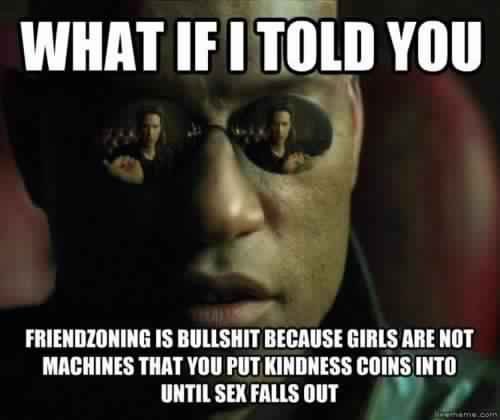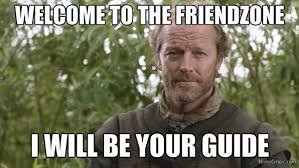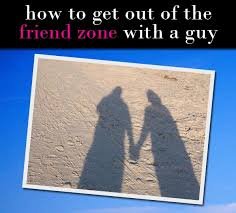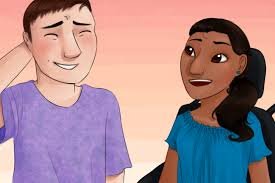The good news is that you CAN get out of the Friend Zone. The idea that once you’re in, you’re in for good is a total myth. My fiance and I knew each other for 2 years before we started dating, and I used to be “weirded out” by the thought of being sexual with him. Then one afternoon, we met for lunch and I kept thinking, “This feels like a date, why is that…” and I walked away feeling butterflies in my stomach. About a week later, he asked me out on our first official date. Now the thought of NOT being sexual with him seems weird to me!
Friends can turn into lovers, and lovers can turn into friends (have you ever known of a relationship where the ‘spark died’?). Not only that, but it is much, much easier to spark attraction with a friend than with a stranger. I will explain why in a moment.
But first, let’s talk about what the Friend Zone is, as distinct from actual friendship. Friendship is a healthy dynamic where both people share interests and enjoy spending time together, without a significant amount of sexual tension. It is possible for men and women to be friends. I have many male friends (and, no, they aren’t all trying to sleep with me–I would be able to pick up on that if it were the case 😉 ).

A friendship between people who could potentially be sexual partners is not completely devoid of any sexuality. For example, in the past when I have gone to the pool or the beach with a male friend, we usually check out each other’s bodies and enjoy the view. However, there is no significant amount of attraction that builds, and not to the point where it distracts from the friendship being a friendship. In a healthy, balanced friendship, both people are in agreement that it is a friendship, and both people prefer to keep it that way.
In the Friend Zone, on the other hand, one person thinks of it as a friendship, and another thinks of it as a sexual relationship. Thus, the problem with the Friend Zone is that the two people involved both have an illusion about the relationship that is not based in reality. It is easy to blame the one with the crush as the one who is “living a fantasy,” but actually, they both are living a fantasy, instead of dealing with reality.
The question of how to handle the Friend Zone is two-fold:
How do you get out of the Friend Zone and spark attraction so you two can start dating?
If they don’t respond to your attempt to spark attraction, how do you handle being in the Friend Zone, gracefully move on, and hopefully retain the friendship (assuming you want it)?
In this article, I will address both of these. Which one you pick will depend on how available and receptive the other person is, and if they are actually a potentially good match for you.
If you have a friend that you want to date, the first thing to do is flirt with them!
What, you say you haven’t done that yet? Afraid to “ruin the friendship”? I have news for you: ever since you developed those crushy, I-want-you feelings, the friendship has already disappeared. Quit making yourself miserable by trying to “save” something that no longer exists, and that you don’t really want anyway.
What, you say you HAVE tried to make your interest known, and they weren’t interested? That sucks, but don’t give up hope just yet; it’s possible (and likely) that you tried to make the transition without properly building up attraction first, and, if you flirt with them the right way this time around, they will return your affection after all.
Attraction is not something that you have (or don’t have); it’s something that you do. Flirting is the process of building attraction. This is done by “dancing” back and forth between similarity (what you two have in common) and polarity (the opposition of masculinity and femininity–regardless of physical gender).
Remember how I said that it’s actually much easier to spark attraction with a friend than with a stranger? Well, that’s because when you first meet someone, you need to establish trust, and trust is primarily established by seeing how much you two are alike and how well you get along (that’s the similarity piece). And you also need to create polarity with them while all this is going on.
Friendship is mostly about similarity–we like people that are like us. So with a friend, you already have similarity well established. You already get along well, and you already trust each other. There is no question about whether or not you enjoy spending time together, and they won’t be wondering, “Who is this person and why are they talking to me” like a stranger might be. So get rid of any silly beliefs you might have about friendship holding you back from being able to date–friendship is one of the best foundations for flirtation that exists!
Now, just add polarity. Seriously. Start acting more masculine or more feminine with them (depending on which way you prefer to go). Touch them more than you used to. Tease them. Pick up the tab instead of splitting it like you usually do. Light candles and set a more romantic mood when they’re at your house.
The mistake that most people make when they realize they want to turn a friendship into a romantic relationship is that they meet with their friend and have a nice conversation about their feelings. This doesn’t work because sitting and talking is more friendship! So of course they’re going to feel like they just want to be friends with you–they haven’t yet gotten a taste of the other side of attraction (the excitement of polarity).
Instead of having a nice little talk with them about your feelings, start subtly showing your feelings by acting less friend-like and more flirtatious. As in, dance between polarity and similarity, instead of staying in the mostly-similar vein of friendship. Let the sexual tension between you two build up while you don’t say anything about it. Let them start thinking that they are the one falling for their friend (that would be you!).
This way, there’s a good chance you might not even have that talk about your feelings until after you’ve kissed. Or, you’ll have it right before you’re about to kiss. Either way, you’ll both be on the same page, and it won’t be this awkward, out-of-the-blue notion for one of you.
Every time I’ve had a friendship successfully transition to a romantic relationship (this has happened to me many times, not just with my fiance!), it happened through us flirting before we discussed that something was different. By the time we ended up kissing/talking about how we wanted to date each other, there had already been a couple of times before then that “felt more like a date” even though we were spending time together under the pretense of friendship.
You won’t know whether or not it’s meant to be more than friendship until you flirt with them and see if they flirt back!
Even those who outright say, “I just want to be friends,” might change their mind if they do flirt back with you. One of my best friends used to call me up and say that she only thought of a certain man as a friend, and she felt awkward that he seemed to like her. Then I saw how much she flirted right back with him and thought, yea, she’s just not aware of her own feelings yet (it happens!). They are now married with a kid.
So then, when do you move on? If they are unavailable (as in, they’re already in a monogamous relationship), or emotionally unavailable (as in, they’ve made it clear they don’t want the same things that you do), move on. Sparking attraction in a friend who wants a bunch of one night stands might get him to pencil you into one of those nights, but it probably won’t change his mind about commitment.
Included in emotional unavailability–and this is the part that sucks–is if they really just don’t want to date you. There is a possibility that if you up the ante by flirting with them, they will not flirt back, and might drift away from you because things “started getting awkward.” You can spark attraction by learning to flirt, and you can’t force someone into wanting you.
The key to handling rejection like this is not to take it personally; what someone wants in a friendship and what they want out of a romantic partner are not always the same thing, in the same way that some good friends could never work together, or live together as roommates.
Getting over the Friend Zone in this case is a lot like getting over an ex: give yourself some space to heal your heart. The worst thing you can do is judge yourself for being stupid or desperate that you can’t just be friends with them and you have all these other feelings. Those feelings are only a sign that you still have a heart that beats, and the fact that those feelings were directed at someone you actually get along with is a sign that you’re actually make good choices when it comes to potential mates (better than chasing psychos!). It just so happens that this particular one didn’t work out, but there are plenty of fish in the sea (cliche, but true).
Remember too that you didn’t “ruin the friendship” with these feelings. In the case of the Friend Zone, there was no friendship there to begin with–there was one person hallucinating a friendship, and another was hallucinating a potential romance, but neither of you was on the same page, so you could just as easily say that the other person is “ruining the romantic connection” by wanting to be friends as you could beat yourself up for wrecking things with them.
Many “friendships” are actually unbalanced Friend Zone situations, so if you aren’t able to date them for whatever reason, sit down and consider whether or not you still want to be friends with them. The friendship you create needs to be a new relationship, not a continuation of the old one.
This means creating the kind of friendship where you both value each other as friends. Friendship is not some consolation prize for those you couldn’t get into bed; it is it’s own kind of wonderful interaction, and needs to be prized as such. There’s a reason why it’s not considered a good idea to throw away all your friendships once you get into a committed relationship–because one isn’t meant to replace another!
Ask yourself: Is this the kind of person you actually want as a true friend? Do you actually want to spend time with each other as FRIENDS, instead of as pretend partners, or as a means to get a shot of those addictive “attraction chemicals” that get released when you’re around them?
The answer to those questions might surprise you, even if you were the one wanting to be with them. And, it’s important to make sure that they also feel that way about you. Be prepared for them to fade out of your life when you stop chasing them; even though they said they wanted to be friends with you, it’s possible that they just wanted a non-committal flirting partner (a.k.a. they were leading you on).
The way to find out if there is a potential for an actual friendship is simple; start treating them like a true friend, and see how they respond to that.
Regardless of what happens, the most important thing to remember about keeping yourself sane and happy is to make sure that all of your relationships–friendship and otherwise–are balanced, and that they are on the same page as you about what’s going on.


